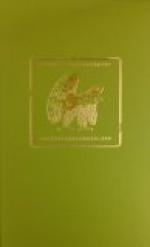“Meantime,” supplemented Tisdale, “he had married his Spanish senorita and her inheritance, the old rancheria, was sunk with his own in the gold mine. Then he began to play fast and loose with his annuity at the San Francisco stock exchange.”
“He hoped to make good quickly. He was getting past his prime, with his daughter’s future to be secured. But it got to be a habit and, after the death of his wife, a passion. His figure was well known on the street; he was called a plunger. Some days he made fortunes; the next lost them. Still he was the same distinguished, courteous gentleman to the end.”
“And that came on the stock exchange, after a prolonged strain. David Weatherbee found him and took him home.” Tisdale paused, then went on, still regarding Foster with that upward look from under his forbidding brows. “It fell to Weatherbee to break the news to the daughter, and ten days later, on the eve of his sailing north to Seattle, that marriage was hurried through.”
There was a silent moment, then Foster said: “Weatherbee loved her, and he was going to Alaska; it was uncertain when he could return; married, he might send for her when conditions were fit. And her father’s affairs were a complete wreck; even the annuity stopped at his death, and there wasn’t an acre of her mother’s inheritance left. Not a relative to take her in.”
“I know; that is why she married Weatherbee.” Tisdale set his lips grimly; he swung around and strode across the floor. “You see, you can’t tell me anything,” he said. “I know all about it. Wait. Listen. I am going over the mountains and look up that land of Weatherbee’s, and I shall probably buy it, but I want you to understand clearly it is only because I hope to carry his project through. Now go north, Foster; take a new grip on things; get to work and let your investments alone.”
After that, when Foster had gone, Tisdale spent a long interval tramping the floor of his breezy room. The furrows still divided his brows, his mouth was set, and a dark color burned and glowed through his tan. But deeper than his angry solicitude for Foster rankled his resentment against this woman. Who was she, he asked himself, that she should fix her hold on level-headed Foster? But he knew her kind. Feversham had called her a “typical American beauty,” but there were many types, and he knew her kind. She was a brunette, of course, showing a swarthier trace of Mexican with the Spanish, and she would have a sort of personal magnetism. She might prove dramatic if roused, but those Spanish-California women were indolent, and they grew heavy early. Big, handsome, voluptuous; just a splendid animal without a spark of soul.




